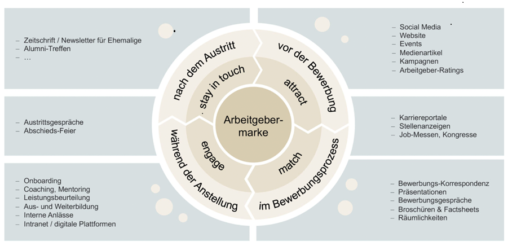
What do car industry and employer branding have in common?
You would like to buy a car? Station wagon, 5-door, hybrid drive or electric car - if you have a choice, you will be spoiled for choice. You can find almost any type of car from any brand. Great showrooms, concessions on the purchase price and a gift on top are almost common practice at any garage. Suppliers are constantly trying to outbid each other to survive in the battle for customers. Because the car industry, like so many others, has a problem: its products are often interchangeable, the markets oversaturated. And this applies not only to the consumer goods markets, but also to the service and markets of capital goods.
Values provide stability
Companies have learned that besides the quality design of their products, it is also important for buyers to know what they stand for and what values they live by - helping them take a decision when the choice is overwhelming.
Brand positioning as a strategic advantage
This also applies to the employer branding of companies in the processing of the job market. The "war for talents" requires a strategic, well-thought-out basis. As you surely know yourself, there is a reason why you choose a BMW, Mercedes or another brand when buying a car. You probably unconsciously ask yourself: "What does the brand stand for?
Success or failure?
The job market is undergoing change: Where job seekers used to apply for positions, the companies now are vying for the best skilled workers. Thereby, a critical success factor is at stake for them: a shortage of competent employees has a direct impact on the marketability of companies.
Skilled personnel is more demanding
Salaries, allowances, bonuses, pension plans, vacation days, etc. are among the must-haves for applicants today, that no longer offer sufficient differentiation potential for decision making for a company. Emotional and qualitative aspects such as purpose, values, tenor and corporate culture are at the same time becoming increasingly important. Therefore, addressing the job market is becoming a strategic challenge that can have a direct impact on the entire corporate brand and its internal and external perception.
Employer value proposition as basis
The set of values, expressed through the content and visual expressions of an employer brand towards existing and potential employees, is formulated as an employer value proposition or EVP.
Developed according to the corporate brand and its corporate culture, the EVP serves as an inspirational and regulatory base for addressing the job market. The messages evolving thereof to existing or future employees must take into consideration two important aspects:
A structured development process ensures that the employer promise can meet these requirements.
Right employer value proposition through co-creation
The two basic aspects for developing an effective and sustainable EVP are:
Collaboration for more success
Within the framework of one or more co-creative workshops, the basis for the future EVP is set: Targeted discussions among the participants lead to statements that are used for the development of the EVP.
Contentwise, the employer value proposition covers defining aspects of the company as an employer, formulated in such a way that they are tangible, actionable, motivating and inspiring for existing and potential talents.
How to become employer of choice
The EVP refers to the corporate culture and the company itself, contains visionary elements for the further development of the company and its employees, and emphasizes possible unique selling points compared to competitors in the job market. This way, an "employing" company turns into an employer of choice that positions itself clearly in the market.
Tangible uniqueness through consistency
The employer value proposition is therefore the basis for market development. To visibly outstand from competitors is the central goal of market development.
It is important to realize that:
Long-term communication on all channels
Authentic uniqueness is therefore not achieved through artificially created distinction, but through the long-term, consistent and multi-faceted communication of one's own brand personality - along the touchpoints of the entire employee experience (cf. illustration).

In the next episodes of our employer branding blog series, you'll learn more about successfully embedding the employer value proposition in markets and your company.